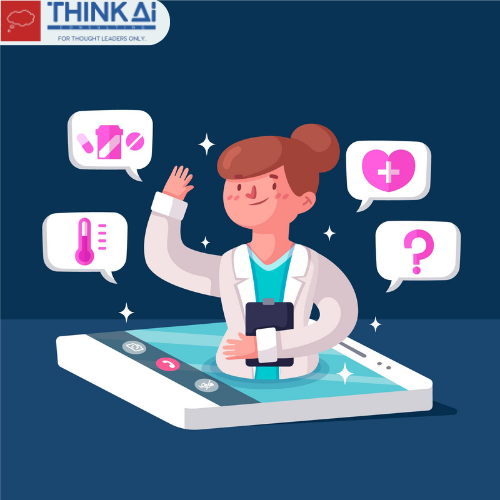AI is playing a key role in ensuring effective medical care and healthcare services for patients visiting your practice or hospital. Patients can now receive necessary healthcare-related information, including the expected date of a doctor’s appointment, in a hassle-free manner.
According to the latest trends, much of the work done by Medical Representatives is now being handled by healthcare chatbots and relevant AI applications. This approach proves to be extremely time-saving and prompt for patients and healthcare professionals alike. From collecting and confidentially storing information to offering timely services, AI chatbots are transforming the healthcare sector.
Statistics show that the healthcare chatbots market is expected to reach $1615 by 2032 at a CAGR of 18% from 2023 to 2032. Given the overwhelming benefits of healthcare chatbots, more and more doctors and healthcare professionals are integrating AI-powered chatbot services into their practices.
Here are some key benefits of AI-powered healthcare chatbots that are disrupting the industry like never before:
Scheduling Doctor’s Appointments
The most important task performed by chatbots is scheduling a doctor’s appointment with a patient. Considering the sensitive nature of healthcare services, patients avoid contacting a doctor if the wait period is too long. Chatbots on websites and apps can be an excellent option for practices to understand the nature of patients’ problems. Based on the severity of the problem, the doctor’s availability can be slightly modified so that patients who need urgent care can receive prompt services.
Round-the-Clock Availability
Healthcare professionals cannot work 24 hours a day. Unfortunately, medical emergencies can happen at any time, and patients need urgent medical assistance promptly. Healthcare chatbot services can be helpful in identifying symptoms and scheduling emergency surgeries and operations on short notice.
Access to Necessary Medical Information
Using superfast healthcare chatbots, healthcare professionals and administrators can easily access large-scale medical data, including symptom diagnosis, potential therapies, and treatment options—all within the app itself.
However, you can’t replace healthcare chatbots with an informative website, because a website can’t answer every question a patient may have. On the contrary, a chatbot is more capable of addressing every patient’s query as it has been specifically created to aid medical care service professionals and patients.
Symptoms and Health-related Issues
NLP-powered chatbots are specifically designed to address patients’ medical conditions and health-related issues. Based on patients’ symptoms, the chatbot can assess their medical condition and suggest appropriate treatment options while connecting them with a doctor or healthcare professional.
Introductory Information
A significant amount of time is spent collecting necessary information from patients, including their name, postal address for communication, email address, contact details, current doctor, and insurance information. When a practice or hospital starts using healthcare chatbot services, much of this information can be easily accessed from patients using the app.
This not only saves time but also helps patients receive the right treatment on time. At the same time, it also helps keep the patients’ loved ones relaxed and calm, as the pre-fed contact information provided by the patient will be stored in the system. The next time the patient visits the doctor, they won’t need to provide all the information again.
Conclusion
Patients’ enrollment for visits and further check-ups is crucial to healthcare practices. AI-powered chatbots can be extremely effective in increasing patients’ enrollment and enhancing the clinic’s awareness among prospective patients.
These chatbots, specific to healthcare services, provide real-time health status monitoring options to patients, along with illness management, to better serve patients and help resolve their doubts, anxieties, and healthcare needs, facilitating their visit to a doctor’s practice or the nearest hospital for further assistance.

